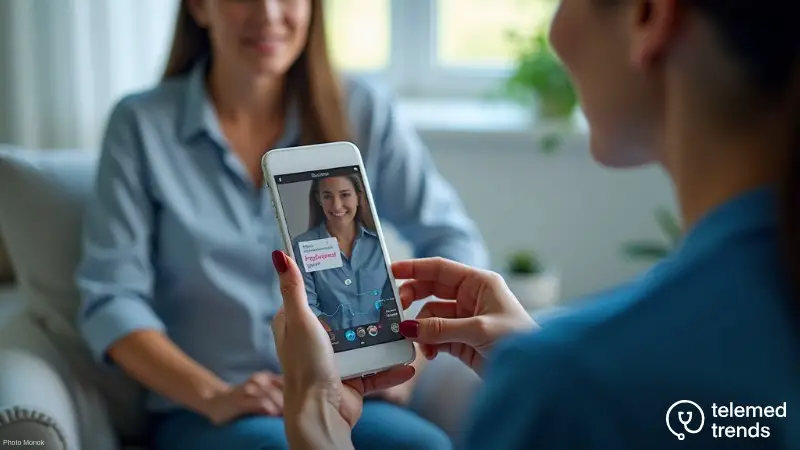Artificial Intelligence (AI) has revolutionized healthcare, transforming the way we understand and treat patients. By integrating AI into medical systems, healthcare has shifted from a reactive model to a proactive one, offering more personalized and efficient care.
From aiding in faster disease diagnosis to creating individualized treatment plans, AI is reshaping the healthcare landscape, especially in continuous patient monitoring.
Key Takeaways
AI-driven wearable devices like BioIntelliSense’s BioSticker™ are transforming continuous patient monitoring by enabling real-time data analysis and early intervention.
- BioIntelliSense’s FDA-cleared BioSticker™ continuously tracks vital signs for up to 30 days, sending data in real time to remote monitoring systems.
- Hicuity Health’s telemetry technicians interpret the data from these devices, allowing for prioritized responses to critical health issues and reducing alarm fatigue.
- Remote monitoring improves healthcare efficiency by scaling patient care without additional on-site staff, benefiting both rural and underserved areas.
AI-driven monitoring: Transforming healthcare
AI is transforming continuous patient monitoring (cRPM) by using wearable devices and real-time data analytics to track vital signs like heart rate, blood pressure, and glucose levels. This enables ongoing health assessments without relying on periodic doctor visits, with AI providing actionable insights for both patients and clinicians.
For patients with chronic conditions, AI can detect early changes in vital signs, allowing for early intervention and preventing complications. This approach is also helpful in post-acute care, reducing readmissions and supporting smoother recoveries.
Role of BioIntelliSense in modern patient monitoring
The BioSticker™ is central to BioIntelliSense’s approach to patient monitoring. The device is an FDA-cleared, wearable sensor that continuously tracks a patient’s vital signs, sending the data in real-time to a remote monitoring system.
This technology enables healthcare providers to closely monitor patients without the need for traditional, cumbersome equipment. Its small, non-invasive design ensures patient comfort while delivering highly accurate and reliable data, which is critical for making informed clinical decisions.
The BioSticker™ offers continuous monitoring for up to 30 days, making it perfect for extended observation and post-surgical recovery. Real-time data is sent to a remote monitoring system, where telemetry technicians analyze it, allowing for early detection of issues like irregular heart rhythms and enabling timely interventions.
Telemetry technicians: Key to remote monitoring
Telemetry technicians are crucial in monitoring and interpreting data from the BioSticker™ and other devices. Trained in electrocardiogram (ECG) technology, they track heart rate, rhythm, and overall cardiac health, ensuring accurate data interpretation and quick response to any alarming changes.
In the traditional hospital setting, telemetry technicians work onsite, directly observing ECG data and adjusting equipment as necessary. However, with the introduction of remote monitoring solutions powered by BioIntelliSense and Hicuity Health, telemetry technicians are now able to monitor multiple patients at once from a central location.
This reduces the burden on bedside nurses, who can then focus on direct patient care, while telemetry technicians handle the complex task of continuous monitoring. This partnership allows hospitals to efficiently scale their monitoring capabilities without requiring additional on-site staff.
Benefits of remote monitoring in patient care
Remote monitoring improves patient safety and reduces alarm fatigue in ICUs, a common issue where frequent alarms desensitize healthcare workers and delay response times.
Telemetry technicians use remote monitoring to prioritize alarms by urgency, allowing for quicker responses to critical issues and better patient outcomes. By automating data collection, BioIntelliSense helps streamline hospital workflows, saving time and reducing errors, enabling clinicians to make faster, more informed decisions.
AI-powered monitoring supports Hospital-at-Home (HaH) programs, providing hospital-level care at home and reducing costs, hospital stays, and infection risks. Wearable devices and AI algorithms track vital signs like heart rate and oxygen levels in real time, allowing timely interventions to keep patients stable.
How the partnership improves healthcare efficiency
The advanced monitoring technology from BioIntelliSense, combined with Hicuity Health’s expert telemetry technicians, boosts hospital efficiency by optimizing staff allocation. Remote monitoring reduces the need for bedside resources, allowing staff to prioritize urgent tasks. This enables hospitals to scale patient monitoring capabilities without adding extra personnel, making the system both cost-effective and efficient.
Additionally, the remote monitoring platform allows for better tracking of patient health over time. Hospitals can now access a wealth of continuous data that provides a more complete picture of a patient’s condition. This data can be used to guide treatment decisions, predict potential complications, and help clinicians avoid preventable health events.
Expanded patient care reach
The partnership between BioIntelliSense and Hicuity Health isn’t limited to critical care units. It also enables healthcare providers to extend remote monitoring to a broader range of patients, including those recovering from surgery or managing chronic conditions.
Patients who may not require full-time hospitalization but need regular monitoring for health conditions such as diabetes or cardiovascular disease can benefit from continuous tracking through the BioSticker™. This expands the reach of healthcare, particularly in rural or underserved areas where access to medical professionals may be limited.
Patients in rural areas may lack immediate access to specialized care, but remote monitoring allows for continuous observation without long travel. This technology reduces healthcare disparities and ensures more patients receive quality care.
Future of remote monitoring in healthcare
As healthcare evolves, wearable devices and remote monitoring systems are playing a growing role. BioIntelliSense and Hicuity Health are leading the way in improving patient safety, healthcare delivery, and hospital efficiency, emphasizing real-time data, timely intervention, and collaboration.
The widespread use of wearable tech like BioSticker™ is shifting healthcare away from traditional monitoring methods. With AI and machine learning integrated, healthcare providers can predict and prevent complications, making more informed decisions for better patient outcomes. BioIntelliSense and Hicuity Health’s partnership is setting a new standard in patient monitoring, combining advanced technology and skilled professionals.
Their work is shaping the future of healthcare, providing continuous, real-time monitoring and enhancing decision-making to improve care.






